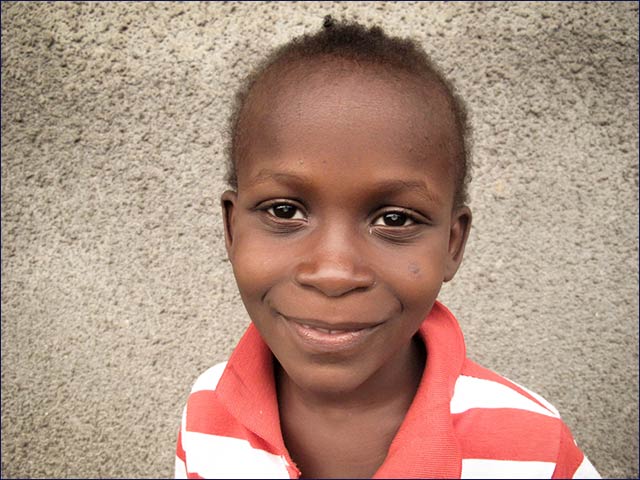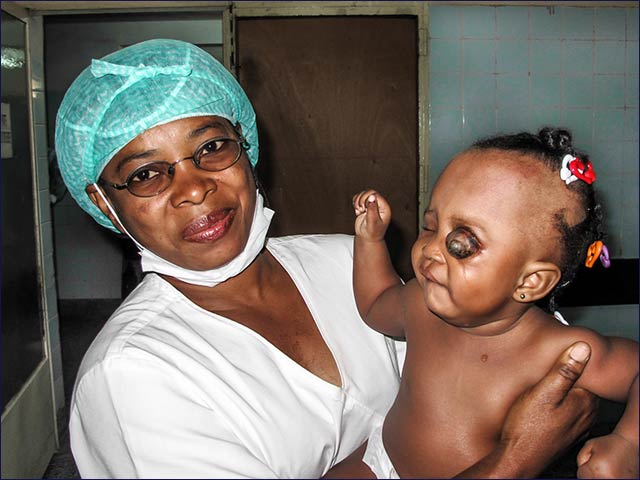By Avigayil Kadesh
When a team of Israeli ophthalmologists and support staff arrived on an
Eye From Zion humanitarian mission to the Democratic Republic of the Congo on July 2, 2014, they could not know that six days later their country would be at war against Hamas in Gaza.
By the time reports started trickling in about nearly half the Israeli population running for cover from missiles day and night, the team had already operated on a good portion of the 102 patients they would eventually treat for free at the public hospital in Kinshasa – including an 11-year-old girl blinded by congenital cataracts and a baby with a cancerous eye tumor.
Should they stay and complete the rest of the sight-saving surgeries, or go home to their families?
“It is really not easy to concentrate on your mission when you know your country is burning and you don’t know the direction things will go,” says Eye From Zion medical manager Dr. Modi Naftali, an eye doctor at Rambam Healthcare Campus in Haifa and Padeh Medical Center (Poriya Hospital) near Tiberias.
“At that time [Operation Protective Edge] was still an air offensive and not a ground offensive, but on the other hand you know your family is in areas that are in the news all the time.”
It was especially difficult for nurse Tzira Botrite, from Soroka University Medical Center in Beersheva, to be away from home as she kept getting WhatsApp messages from her loved ones whenever they had to run to the bomb shelter.
Ultimately, the team decided to stay put for the full scheduled time, until July 11. “We had a mission to complete,” Naftali explains simply.
 Rebeka can see again
Rebeka can see againProud to be Israeli
Founded in 2007, Eye from Zion provides free eye surgeries to needy populations in places including
Maldives, Vietnam, Azerbaijan, Kyrgyzstan,
Nepal, Micronesia, Myanmar and
Ethiopia.
As they work, they train local medical personnel on new ophthalmological procedures and leave them with equipment to do it.
The organization works in partnership with the American Jewish Joint Distribution Committee (JDC), MASHAV (Israel’s Agency for International Development Cooperation), the Israeli Foreign Ministry and the
LR Group.
The Congo mission was headed by Eye From Zion founder Nati Marcus. In addition to Naftali and Botrite, the team included Dr. Fani Segev from Kfar Saba’s Meir Medical Center, Prof. Guy Ben-Simon from Sheba Medical Center-Tel Hashomer, and Moshe Turiski of the LR Group. They brought along half a ton of medical supplies and medications.
“The Israeli medical team heard such warm gratitude from government ministers who came in person to thank us, and we heard it from the local medical team and from people in the streets,” Marcus says. “I was proud to be an Israeli in the Democratic Republic of the Congo.”
Naftali notes that 102 procedures, many under general anesthesia, was a significant accomplishment in a 10-day mission, especially considering down time for travel and setup, plus unexpected problems with equipment and infrastructure.
“Even so, we treated only a small percentage of the patients who needed us,” he says. “We worked until we used up all the supplies we brought, and at the end we improvised all kinds of things until we finished treating every patient on our list.”
He performed many routine cataract surgeries – routine, that is, for Israel and not for the Congo – and Segev performed the complex procedure that removed the cataracts from young Rebeka’s blinded eyes. Ben-Simon removed a huge malignant tumor from a baby’s eye. “If something can save her life, that could be it,” says Naftali.

This baby’s tumor was removed and she’ll get follow-up care in IsraelBefore leaving Kinshasa, Ben-Simon arranged for the little girl to come to Israel for follow-up cancer care, and he promised two Congolese patients state-of-the-art prosthetic eyes from Israel after having to remove one diseased eye from each of them.
Eye From Zion will send a delegation to Kyrgyzstan in September (2014) and to Myanmar in November.